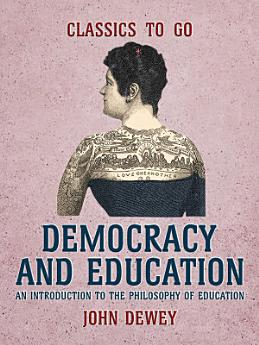Democracy and Education An Introduction to the Philosophy of Education
May 2022 · Otbebookpublishing
Ebook
313
Pages
family_home
Eligible
info
reportRatings and reviews aren’t verified Learn More
About this ebook
In Democracy and Education, Dewey argues that the primary ineluctable facts of the birth and death of each one of the constituent members in a social group determine the necessity of education.
About the author
John Dewey (1859-1952) was an American philosopher, psychologist, and educational reformer whose ideas have left an indelible mark on modern education and social thought. Born in Burlington, Vermont, Dewey's early life in a small town shaped his belief in the power of community and democratic participation. He graduated from the University of Vermont in 1879 and later earned his Ph.D. from Johns Hopkins University.Dewey's career spanned several prestigious institutions, including the University of Chicago and Columbia University, where he developed his theories on pragmatism and experiential learning. His innovative ideas challenged the traditional, rigid education system, advocating for a more interactive and student-centered approach. Dewey believed that education should not only impart knowledge but also foster critical thinking and active citizenship.A prolific writer, Dewey's contributions extend beyond education to philosophy, psychology, and social reform. His works on democracy, ethics, and logic have influenced contemporary thinkers and educators worldwide. Dewey's advocacy for progressive education and his belief in the interconnectedness of education and democracy were revolutionary, often placing him at the center of intellectual and political debates.Not without controversy, Dewey's ideas were sometimes criticized for being too idealistic or impractical. However, his vision of education as a tool for social change and personal growth continues to resonate, inspiring modern educational practices and policies. Dewey's legacy endures as a testament to his belief in the potential of every individual to contribute meaningfully to society.
Rate this ebook
Tell us what you think.
Reading information
Smartphones and tablets
Install the Google Play Books app for Android and iPad/iPhone. It syncs automatically with your account and allows you to read online or offline wherever you are.
Laptops and computers
You can listen to audiobooks purchased on Google Play using your computer's web browser.
eReaders and other devices
To read on e-ink devices like Kobo eReaders, you'll need to download a file and transfer it to your device. Follow the detailed Help Center instructions to transfer the files to supported eReaders.








